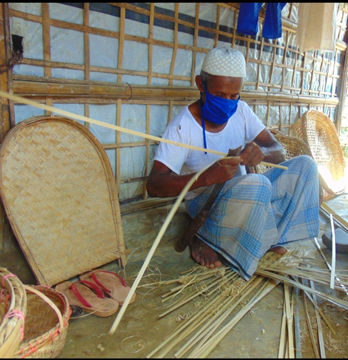Finding independence through livelihood
For years Rohingya men, women and children have faced systematic discrimination and violent attacks, forcing them from the Rakhine state in Myanmar to Bangladesh. In 2017 the largest refugee influx took place and since then an estimated 745,000 Rohingya have fled into Cox’s Bazar.
Abdur Rashid, 71, from Myanmar arrived in Bangladesh with his wife and eight children after fleeing violence in 2017. Here, he tells us what he faced and how our Age Friendly Spaces have helped him.

“We went through a horrible experience. Hundreds of thousands of people fled together and began living in open fields in Teknaf just after entering to Bangladesh border, where there was no shelter, toilets, water and food, not even the slightest protection. A miserable life passed and gradually the host community and NGO workers started coming to us and provided support as much as they could. After staying in Teknaf for several days, I started living in number 18 camp with my family. Even then this place was just a hill and later camps were gradually constructed with the support of NGOs. There was no one to help the older people, we weren’t prioritized at all then. I cried out for a little help, but no one looked at me easily as I got older”.
At the moment Abdur and his wife still live in Camp 18 in Cox’s Bazar while their five daughters and three sons occasionally visit from nearby camps where they live with their spouses. Abdur receives age specific support from one of our six Age Friendly Spaces.
Through our project to provide humanitarian help to meet older people’s specific needs, Abdur has received medical treatment and is now in reasonable health. He receives psychological support from the doctor at his Age Friendly Space when required and also uses the space to spend time with other older people and learn about social and health issues from sessions held. He said:
“We have benefited from the services being offered by the Aged Friendly Space. We get regular checkups, physiotherapy, and nutrition support. These services are also available for those who are bedridden. I have also received clothes, household items including blankets and a cooking pot, and glasses to help me work. During COVID-19 we also received hygiene kits, which included masks and soap, and awareness sessions on how to protect ourselves throughout the pandemic.
We, the older people did not get access to the services available at other service centers and had no convenient place where we could raise our voices. Actions for older people have been taken through this project. For example, a stairway to help mobility and an age friendly toilet in the space so we don’t have to stand in long queues.”
Before Abdur had to flee, he was healthy and happy, owning his own house and a small amount of land to cultivate. He made baskets with cane and bamboo. Through our project, Abdur has also received materials to make things to sell, including bamboo and rope. He said:
“I left all my belongings and assets in Myanmar to flee. When we arrived, I didn’t have any money, living off of rations from the World Food Programme. I have lots of indigenous knowledge and experience of work and I was keen to use this to support myself here. This dream has been fulfilled by this project, through the support I have received I have been making multipurpose baskets to sell which means I can now buy food and clothes from the market. I don’t get upset now and pass time with my livelihood. Since my little business has grown I have been able to save money and hope to open a grocery store in front of my house. I don’t feel helpless anymore.”
Regular donations change lives
Our work relies on monthly donations. A monthly gift from you could transform the lives of so many people.
 Follow us on social media
Follow us on social media
Keep seeing our stories or ask us a question - connect on Facebook and Twitter.
